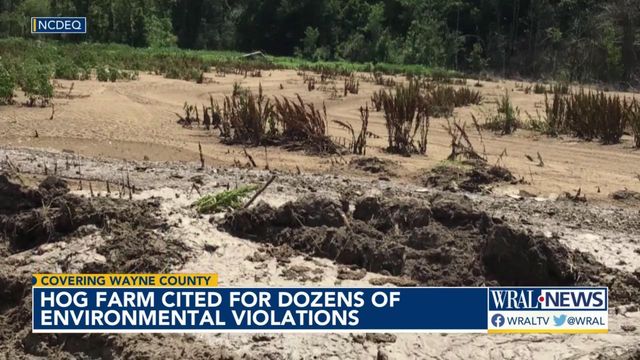'Disgusting': Environmental groups call for more oversight after hog waste system erupts
Environmental advocates are calling for more transparency and oversight of hog-waste digesters after a system on a Wayne County farm erupted May 30, flooding the area with millions of gallons of gray, greasy, foamy waste.
Posted — UpdatedLike many hog farms, White Oak uses a digester system to turn hog waste into methane to sell to utilities. Digester systems cover hog waste lagoons with large, balloon-like membranes. As the waste decomposes, it releases methane, which is natural gas. The digester captures that natural gas to sell to utilities for power. North Carolina law specifically requires utilities to buy this gas to ensure a market for it.
What Krop saw on Aug. 3, she says, were multiple holes in the digester at White Oak. She also noticed that the ground around the site had been disturbed and was missing its vegetation.
"There were splits on covers of the lagoons that were supposed to be generating biogas. And in several areas, you could see the contents within the lagoons," Krop told WRAL News. "It was pretty apparent that something had been going on around the facility besides its production of biogas."
When members of Sound Rivers requested public records from North Carolina Department of Environmental Quality to investigate, they were surprised to learn that White Oak Farms had had a massive spill in May. Some 3 million gallons of waste had erupted from the digester across the farm and into surrounding wetlands. The spill, first reported to NCDEQ on May 30, went on for several weeks, according to NCDEQ's notice of violation report.
They were also shocked to learn that it wasn’t just hog waste, either. The farm was allowed by the state to put dead hogs and food waste into the digester as well. That’s what erupted in a greasy tide of gray foam. Photos taken by NCDEQ show a layer more than a foot deep covering much of the farm operation.
"What we're actually looking at in those photographs is a disgusting slurry of animal parts," Krop said. "Dead hogs, food waste, like hot dogs, deli meat and swine waste turned into what the facility calls a slurry."
Krop said Sound Rivers had never heard of a farm being allowed to put those materials into a digester.
According to the North Carolina Department of Agriculture, which had to OK the project, White Oak is the only farm currently permitted to use those materials in its digester. In 2020, farm owners Deborah and Todd Ballance applied for and were granted a state permit for an "innovative" digester system that would allow them to include liquefied dead pigs and waste meat from the nearby Smithfield processing facility.
Deborah Ballance declined an interview request.
The permit, approved by NCDEQ as well as the state veterinarian’s office within the agriculture department, specified that hog waste had to make up at least 50% of the digester’s fuel. It also limited the amount of dead-animal and waste meat to 20,000 pounds per day.
But records provided to NCDEQ by the farm showed they had few hogs left to generate waste, while they often received much more dead animal and food waste than the permitted amount on a given day.
In a response to the agency's report, Todd Ballance said he had calculated the volume of allowable food waste and dead animal material based on percentages of water and solids. However, state records don't show that regulators made any such distinctions.
The May spill wasn't the first trouble with the system. In February, a routine NCDEQ inspection found the same foam leaking from one side of the digester. NCDEQ issued a notice of violations but didn’t penalize the farm — despite a long history of other violations — and allowed the system to continue to operate.
Krop said the agency also didn't notify the public when that leak turned into the massive spill in May, although the farm owners, as required by law, did report a “wastewater foam” spill to their local newspaper.
"This is one example of how the DEQ truly did have the means to prevent this environmental disaster and chose not to," Krop said. "The department failed to take meaningful action to prevent this major pollution event from happening. And they failed to notify the public when a pollution event did occur. And so, you know, this is folks drinking water we're talking about, it's the water that they swim in. It's the water that they fish from."
An NCDEQ spokeswoman said in a statement that the agency did not alert the public to the spill because it determined it did not pose a significant risk to the public. Agency officials declined to be interviewed for this story.
NCDEQ's most recent Notice of Violation, dated Sept. 2, cites the farm on 15 counts including failure to abide by the operational requirements of their permit, submit required reports, and monitor air and water pollution near the system as required by law.
Sound Rivers and the Southern Environmental Law Center sent NCDEQ a letter Thursday morning, calling for better oversight of digester systems and greater transparency in the wake of the incident.
The farm’s owners did file a cleanup plan with the state. It’s not clear whether it’s completed yet.
Related Topics
• Credits
Copyright 2024 by Capitol Broadcasting Company. All rights reserved. This material may not be published, broadcast, rewritten or redistributed.






